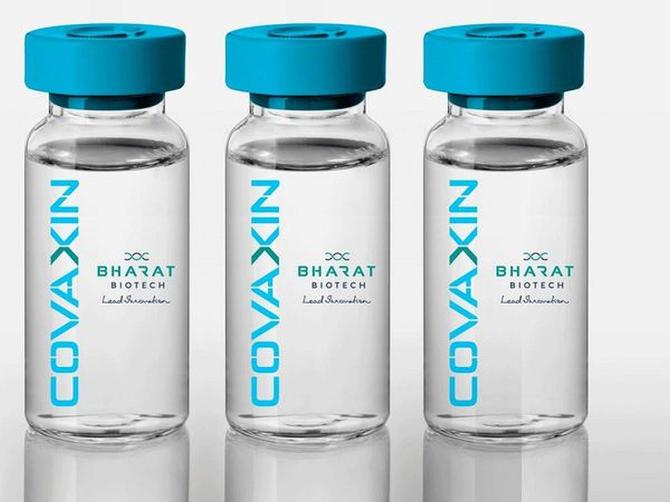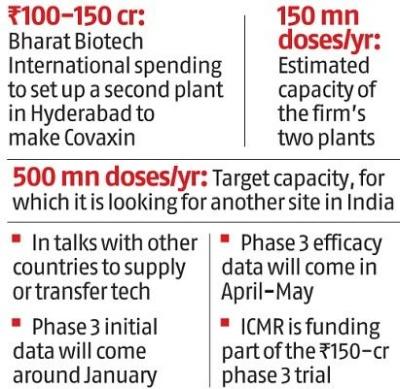The first vaccine candidate will be an intra-muscular one, followed by intra-dermal and nasal ones, depending on test results, reports Sohini Das.

As India's first indigenous COVID-19 vaccine candidate gets the nod for phase 3 trials, Hyderabad-based vaccine maker Bharat Biotech has not only started the at-risk manufacturing of its candidate Covaxin, but is also looking to ramp up capacities.
The first vaccine candidate will be an intra-muscular one, followed by intra-dermal and nasal ones, depending on test results.
Besides setting up a second plant at its Genome Valley facility in Hyderabad to make Covaxin, the firm is looking for another site in the country to make the vaccine.
"We are investing to set up a second plant at our Hyderabad site to make Covaxin. We have one plant. Together, these two plants can make 150 million doses a year," says Sai Prasad, executive director, Bharat Biotech International.
"We are also looking for another site in India where we can make the vaccine, so that capacities can be ramped up to over 500 million a year," Prasad adds.
BBIL is spending Rs 100 crore to Rs 150 crore (Rs 1 billion to Rs 1.5 billion) to set up the manufacturing plant. BBIL, Prasad adds, is open to contract manufacturing and is working on accessing one of its own sites which could be converted into a Covaxin-manufacturing one.
This would be crucial as BBIL expects to forge global partnerships with international agencies like Gavi and also some countries for Covaxin by December.
"Our priority will be to supply the vaccine in our own country. We are also in talks with several nations and international agencies like Gavi which are interested in our vaccine," says Prasad.
He said these partnerships could be of three types: Some wanted to buy the vaccine, some wanted to do their own clinical trials, and some others wanted BBIL to do a tech transfer so that a local company could make the vaccine.
It has some doses ready and can release them to the market once government approval comes.
As for the cost of the trials, the company says it will be around Rs 150 crore and it is a risk for the firm.
The Indian Council of Medical Research, however, has said it will share the cost. While BBIL did not wish to put a figure to it, Prasad says it is a significant portion because ICMR would be working with it on testing and some other key parameters.
BBIL has not planned to raise any debt to fund the trials or its expansion, and it is doing it from internal accruals.

The company is gearing up for a large-scale phase 3 trial in India on over 28,000 subjects and expects to generate early efficacy data by April next year.
This would also be the first independent efficacy trial by BBIL. In earlier studies for Rotavax (rotavirus vaccine) and typhoid conjugate vaccine, it had partners.
Typically, vaccine-efficacy studies measure the effectiveness of a vaccine by comparing the disease rate in vaccinated and un-vaccinated groups.
Thus, it is important to have a certain number of disease cases in the cohort to un-blind or analyse the study data.
These are blinded studies, which means who gets a placebo and who gets a vaccine shot is not initially known.
"The reason we are taking a large cohort is to first ensure the safety by testing it on different demographics, and, secondly, it will help us to have an early read-out in efficacy," says Prasad
He explains that the firm would have to wait until a certain number of cases (people with Covid infection) happened in the cohort to un-blind the data.
"By the January-February timeline, we will have some initial data from phase 3, but the efficacy data will be blinded. It will depend on case accumulation. We will have to wait for a certain number of cases, and until we have that we cannot un-blind the data," says Prasad.
"When we do a trial design, we take into account the attack rates, the disease type, the ability of us to detect the disease and then the recruitment timelines," he adds.
Government sources indicate that India plans to start vaccinating its essential services workers (around 30 million) around January. Will we have enough data by then?
BBIL says by December-January it should have at least four to six months of observation data from volunteers (who got a jab in phase 1).
The phase 3 efficacy data will come around the second quarter of 2021, or April-May. "Even after the efficacy readout, we plan to follow the phase 3 subjects for around a year,;" says Prasad.
While the firm has set no internal deadline for recruitment, a back-of-the-envelope calculation shows if the sites (around 20) manage to recruit 30 to 50 candidates daily or every few days, then trial recruitment would not take long, says Prasad. Each site is likely to handle 1,000 to 2,000 subjects.
Will Covaxin need a booster dose?
Prasad says the evaluation of the phase 1 data for neutralising antibodies had shown good immunogenicity.
Analysis of the phase 2 data is on. "We have tested four different strains (clades) in India and done work on functional immunological assays," he says, "which will show us if this generates T-cell response, memory response, etc."
Feature Presentation: Rajesh Alva/Rediff.com












 © 2025
© 2025